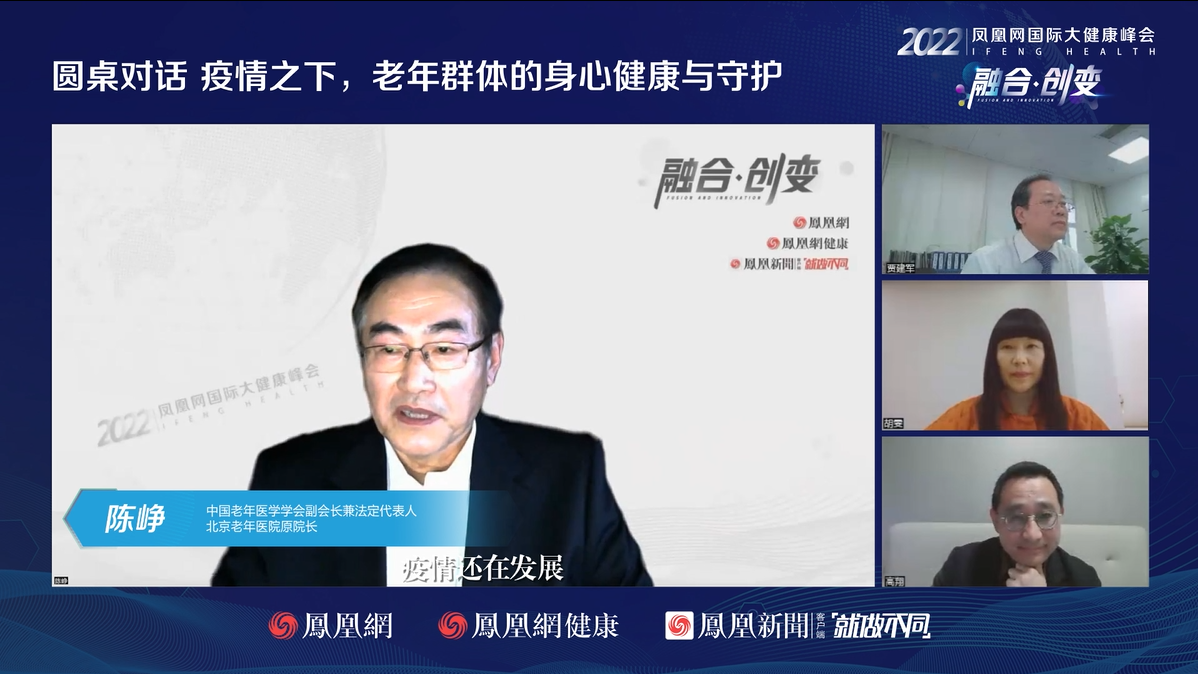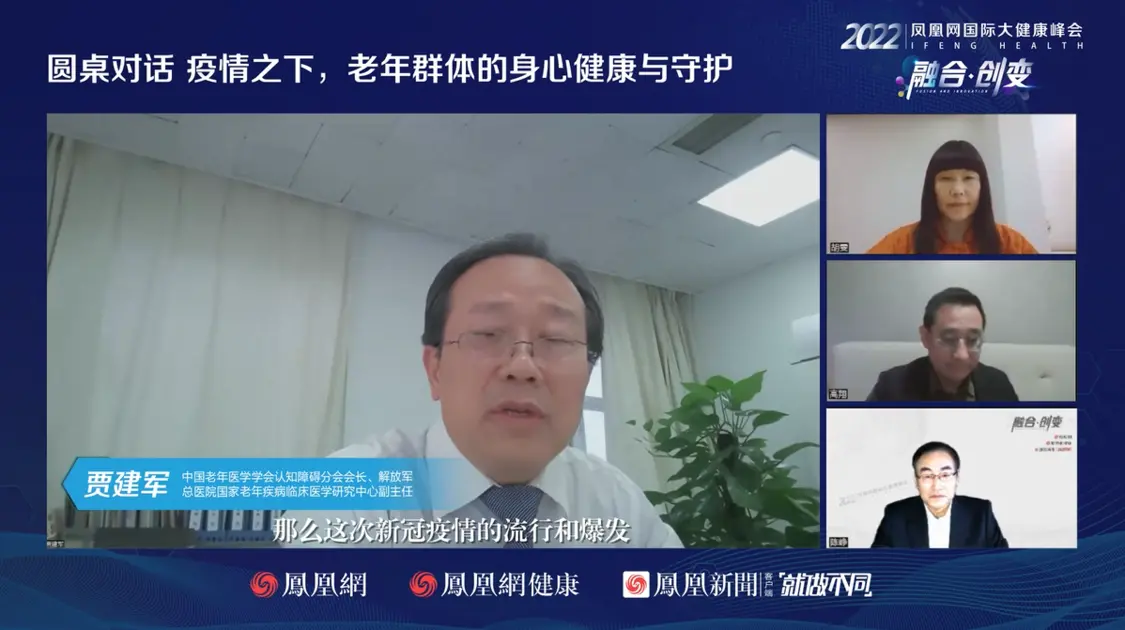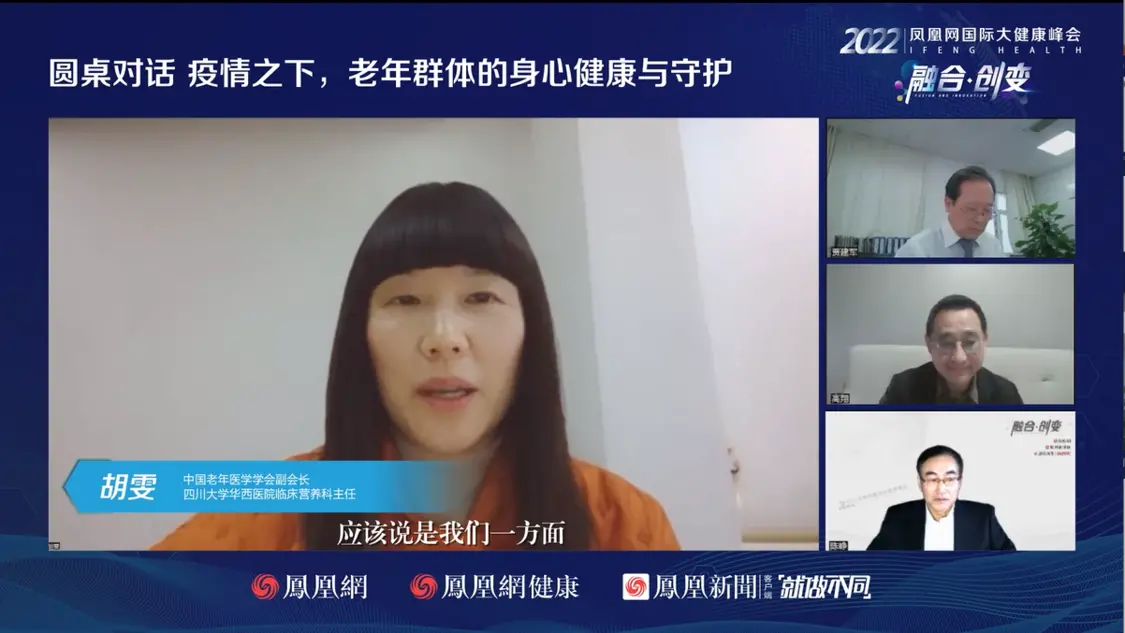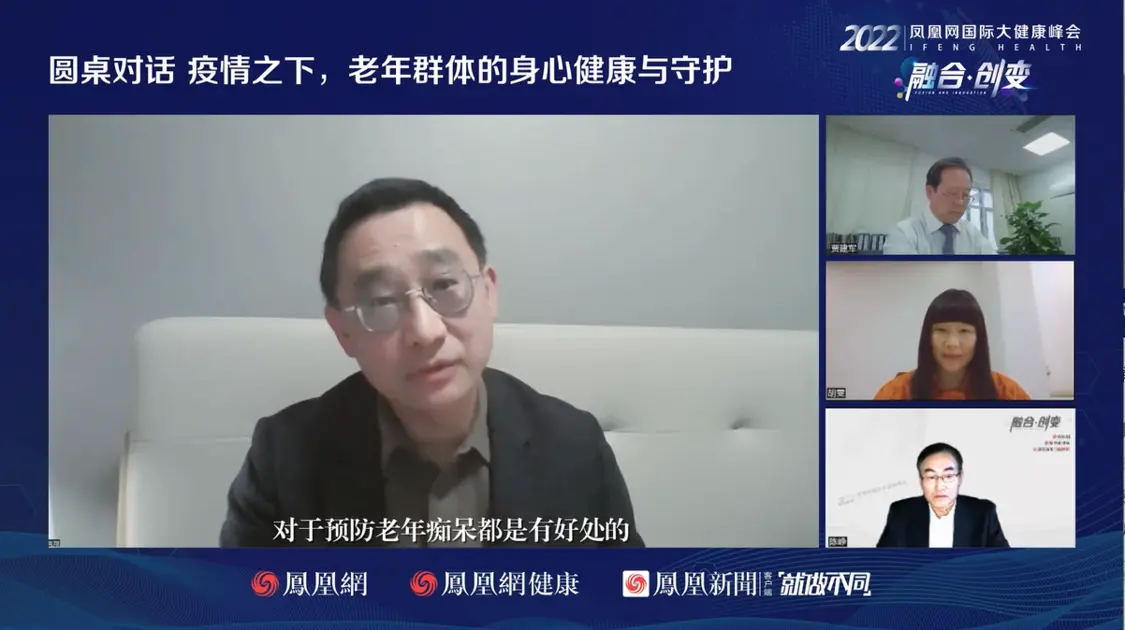The Chinese Society of Geriatrics was invited to participate in the round-table dialogue of the "Phoenix Network 2022 International Health Summit" as an academic support unit.
On December 27, 2022, sponsored by Ifeng.com and hosted by Ifeng.com Health, the Chinese Geriatrics Society participated in the "Ifeng.com 2022 International Health Summit" as an academic support unit with the theme of "Under the Epidemic,
Roundtable dialogue on Physical and mental health and protection of the elderly.
 Professor Chen Zheng, Vice President and legal representative of Chinese Geriatric Society and former President of Beijing Geriatric Hospital as the moderator, and Professor Jia Jianjun, President of Cognitive Disorders Branch of Chinese Geriatric Society and Deputy director of National Clinical Medical Research Center for Geriatric Diseases of PLA General Hospital; Professor Hu Wen, Vice President of Chinese Geriatric Society and Director of Clinical Nutrition Department of West China Hospital, Sichuan University; Professor Gao Xiang, distinguished Professor of Fudan University, epidemiologist and former president of the Epidemiology Branch of the American Society of Nutrition, discussed and shared experience and gave practical suggestions on the theme of ";Physical and mental health and protection of the elderly under the epidemic";.
Professor Chen Zheng, Vice President and legal representative of Chinese Geriatric Society and former President of Beijing Geriatric Hospital as the moderator, and Professor Jia Jianjun, President of Cognitive Disorders Branch of Chinese Geriatric Society and Deputy director of National Clinical Medical Research Center for Geriatric Diseases of PLA General Hospital; Professor Hu Wen, Vice President of Chinese Geriatric Society and Director of Clinical Nutrition Department of West China Hospital, Sichuan University; Professor Gao Xiang, distinguished Professor of Fudan University, epidemiologist and former president of the Epidemiology Branch of the American Society of Nutrition, discussed and shared experience and gave practical suggestions on the theme of ";Physical and mental health and protection of the elderly under the epidemic";.
Professor Chen Zheng said that with the recent spread of the epidemic, the elderly over the age of 60, as a "vulnerable" group in terms of physical health, are at greater risk from the new coronavirus and have received more attention from the society. As you know, by the end of 2021, the elderly population aged 60 and above in China has reached 267.36 million, accounting for 18.9% of the total population. The physical and mental health of such a large group cannot be neglected at any time.
 For more information, please copy the link in your browser: ishare.ifeng.com
For more information, please copy the link in your browser: ishare.ifeng.com
Professor Jia Jianjun, President of the Cognitive Disorders Branch of the Chinese Geriatric Society and deputy director of the National Clinical Medical Research Center for Geriatric Diseases of the PLA General Hospital, is an expert in the field of geriatric cognitive disorders in China, especially in the diagnosis and treatment of Alzheimer's disease. Professor Jia Jianjun said that the epidemic and outbreak of the novel coronavirus have greatly affected the lives of people around the world. In addition to the direct threat to people's physical health, the COVID-19 pandemic has also had a huge impact on their daily lives, such as psychological and social interaction. Professor Jia Jianjun stressed that there is a lot of evidence that the prevalence of mental health among elderly people with cognitive impairment is gradually increasing during the COVID-19 pandemic. The number of elderly people with recognition disorders in China has exceeded 50 million, including about 10 million dementia patients, about 40 million patients with mild cognitive dysfunction (MCI patients), because this group's access to information is greatly reduced, unable to communicate and contact the outside world effectively, and should become the focus of social attention and focus. He called for multi-system and multi-mode psychological intervention, such as the participation of social and academic groups, communities, and medical systems, to help the elderly through this special period.
On how to take care of the elderly around him, Professor Jia Jianjun gave four suggestions: First, guide the elderly to control their emotions; The second is to guide the elderly to forget their own troubles; Third, it is suggested that the elderly take part in some social work within their capacity; Fourth, it is recommended that the elderly pay attention to appearance and maintain a young mind.
 For more information, please copy the link in your browser: ishare.ifeng.com
For more information, please copy the link in your browser: ishare.ifeng.com
Professor Hu Wen, vice president of the Chinese Geriatric Society and director of the Clinical Nutrition Department of West China Hospital of Sichuan University, said,
Under the epidemic, another important health appeal for the elderly is nutrition. The elderly generally have a traditional concept, that money is difficult to buy old thin, and many people suffer from chronic diseases such as diabetes, hyperlipidemia, as well as aging caused by appetite loss, malabsorption and other factors, so there is often a nutritional imbalance in nutrition.
Professor Hu Wen introduced that the nutritional needs of the elderly have very distinct age characteristics. The first is the metabolism of protein, and in the current situation of the epidemic, it is also advocated for the intake of high-quality protein. Many elderly people have chronic metabolic diseases, and there are certain restrictions on many foods, resulting in some elderly people are not willing to eat high-quality protein foods such as meat, which will lead to protein loss. Therefore, it is necessary to balance the selection and collocation in fish, milk and eggs and soy products. In addition, chronic metabolic diseases are common in the elderly, so the metabolism and elimination of body fat will also be delayed, and the ability to digest and absorb will be weakened. So there are some restrictions on fats, especially saturated fatty acids. Therefore, according to their own different situations, to do analysis and processing. In addition, the elderly should pay special attention to their weight. During the epidemic, we also found that many patients in the outpatient department were fine, but because of some panic brought by the epidemic, or some tension and anxiety, suddenly there was a dietary intake problem, and then the weight declined, which should cause enough attention.
Professor Hu Wen stressed that nutrition requires a balanced and diversified diet to really improve immunity. She used ";ten fists to eat longevity" to describe the three meals a day collocation rule, but also particularly suggested that for the elderly, fun eating is more important, that is, do not limit taste preferences too much, as long as love to eat, can eat, it is good.
 For more information, please copy the link in your browser: ishare.ifeng.com
For more information, please copy the link in your browser: ishare.ifeng.com
Professor Gao Xiang, distinguished professor of Fudan University and former chairman of the Epidemiology Branch of the American Society of Nutrition, first compared the differences between China and foreign countries in sun exposure, obesity and thinness, and said that the behavior of Chinese and foreign elderly people and the risk or protective factors that have led to age-related diseases are very different, so sometimes we can not copy some foreign research results. Directly to the elderly in China.
Professor Gao Xiang made several suggestions for preventing brain aging. The first point is that outdoor exercise is very crucial, very important. Second, the elderly to prevent brain aging, it is very important to stimulate more, more communication, to frequently stimulate the brain, to often produce communication. For example, playing cards and mahjong are good for the prevention of Alzheimer's disease, and even for some elderly people, let him go to watch TV, which has a certain effect, is to increase the stimulation of the brain. Third, pay more attention to the supplement of drinking water, tea and coffee have a small amount of caffeine, tea also has a strong antioxidant function. A study by his team based on the Kailuan Cohort in China found that drinking tea has significant benefits for blood lipids and cardiovascular health.
Finally, from the perspective of children, Professor Gao Xiang suggested that the public should communicate more with their parents or elders, no matter what form of communication is OK, as long as it can provide them with enough brain stimulation. Through communication, we can help elders to relieve their depression and other emotions as much as possible.
This roundtable forum has received great attention from netizens, and the wonderful discussions and experiences shared by experts have provided a reference basis for the elderly and their families, which has played a role in promoting the health maintenance of the elderly during the epidemic. Professor Chen Zheng said that the Chinese Geriatric Society will continue to make more efforts and contributions in the development of geriatric medicine and elderly health maintenance.
Prev
In 2025, the first "dual-teacher Class" for medical and elderly care integration and palliative care was launched - systematically cultivating talents in elderly health services to empower the high-quality development of the elderly health cause
Next
The General Election Meeting of the Medical Care Branch of the Chinese Society of Geriatrics

